Eight Decades of Excellence
Click through the years below to see some of Hunt's many achievements and accomplishments.
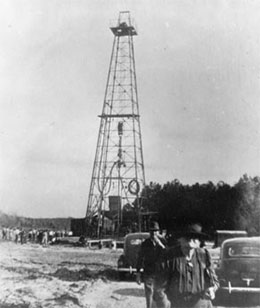
1944
Laying the Foundation
The story of Hunt Refining Company begins with H.L. Hunt and the creation of Hunt Oil Company in 1934. Ten years later, oil was discovered in the Gilbertown Field in Choctaw County, Alabama. This was the first discovery of oil in the area and another example where Hunt Oil Company continued the tradition of discovering oil in places where others never thought to look.
The next year, Hunt Oil Company began looking for a site to develop a refinery to process oil from the Gilbertown Field. The town of Tuscaloosa, Alabama was chosen for its proximity to road, rail and the Black Warrior River.
The refinery was built, and in 1946, a 3,500 barrel per day refinery began producing asphalt for central and west Alabama. The foundation was laid for Hunt Refining Company.
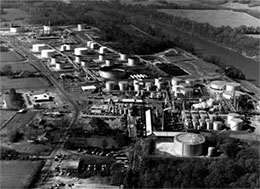
1976
Celebrating 30 Years
As the Tuscaloosa operation celebrated its 30th anniversary, the refinery was completing a third major expansion. The $20-million investment increased capacity to 35,000 barrels per day, doubling diesel production, tripling gasoline production and enabling the refinery to produce sulfur useful to the chemical industry.
For the first time since his father's death, Ray Hunt visited the Tuscaloosa refinery in 1976 as president of Hunt Oil. He presented five employees with service awards, congratulating them on their 30 years of service with the company. All five of these employees had worked on the construction of the original refinery in 1946.
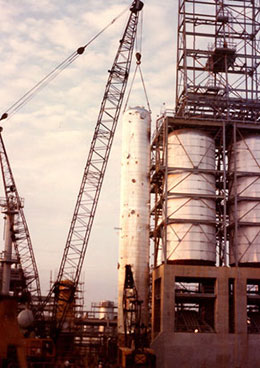
1981
Expansion Proves Valuable
In 1981, the Tuscaloosa refinery completed a $60-million expansion project designed to utilize surplus capacity in existing facilities and optimize utilization of the total refining facilities. The construction of the delayed Coker offered the refinery more flexibility to operate in increasingly unpredictable markets. This enabled the refinery to take heavy, sour crude and, by thermal cracking, convert about 80 percent to heavy gas oil and lighter products and the remainder into petroleum coke.
With the help of the delayed Coker, the Tuscaloosa refinery was a successful venture in Hunt Oil's energy-related areas of operation at a time when many other refineries were struggling to break even.
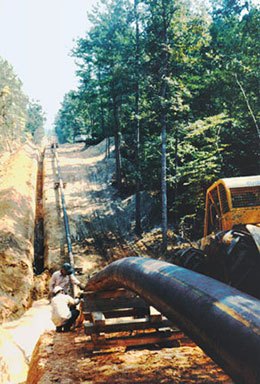
1986
New Markets, New Name
In 1984, Hunt built a 25-mile pipeline connecting the Tuscaloosa facility to the Colonial Pipeline at Moundville, Alabama. The Colonial Pipeline extends from the Texas Gulf Coast to the state of New Jersey. The pipeline connection could now provide transportation fuels produced at the Tuscaloosa refinery to East Coast markets.
In late 1986, under the Hunt family of companies, Hunt Refining Company was launched.
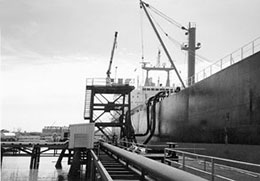
1991
Global Access
The early 1990s saw an increase of Hunt Refining Company's throughput to 40,000 barrels per day, as well as importing crude oil from Mexico, Venezuela and Saudi Arabia. The success and reputation of the small company was not lost on Saudi Arabia. The 10,000 barrel per day crude supply contract with Hunt Refining Company was the smallest contract for Arab Heavy that Saudi Arabia had awarded at that time.
The increase in crude required additional storage, and in 1991, Hunt Refining Company purchased Mobile Bulk Terminal, which owned a 1.3 million barrel storage terminal on Mobile Bay in Alabama. Renamed Alabama Bulk Terminal, the facility gave Hunt Refining Company a secure storage facility base for imported crude oils, as well as a storage outlet for product. This location on the Gulf Coast also created a platform for Hunt Refining Company to market asphalt to south Alabama and northern parts of Florida.
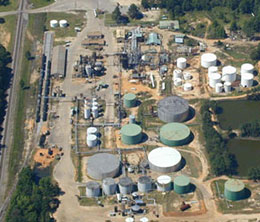
2003
Growth Through Acquisition
In 2003, Hunt Refining Company acquired Mississippi asphalt refining assets from Southland Oil Company. This included two asphalt refineries located in Sandersville and Lumberton and an asphalt and intermediate products terminal located in Vicksburg. This acquisition was important to strengthen the long-time asphalt position Hunt Refining Company had held in this region and because it improved the ability to effectively purchase heavy crudes produced in Alabama and Mississippi. The Lumberton location is currently being utilized as a terminal; the acquisition added 10,000 barrels of crude processing capacity per day, over 1 million barrels of storage and three terminal locations to support customers.
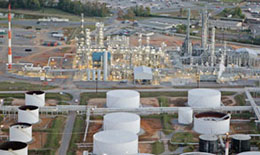
2010
Expansion Project
Hunt Refining Company has continued to show an ability to adapt, change and grow in response to changing market conditions and customer demands. In 2010, Hunt Refining Company completed a three-year expansion project of the Tuscaloosa refinery that took its capacity from 52,000 barrels per day to 72,000 barrels per day. As a result of the expansion project, the refinery doubled the amount of gasoline and distillates that it produces and strengthened its capability to process various crude streams.
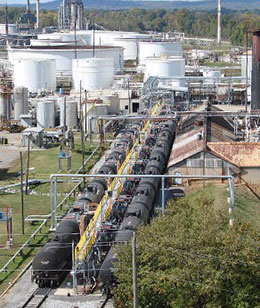
2013
Rail Project
Prior to 2011, Hunt Refining Company accessed crude oil primarily via the U.S. Gulf Coast. In response to North American crude production opportunities, the company developed a logistics strategy to diversify and improve the flexibility of its supply chain to utilize crude oils from North America.
In Canada, much of the crude oil is situated in remote locations and is too viscous for pipeline transport. A key component of the northern crude oil procurement strategy was to deliver crude in heated railcars from these remote sites to Hunt's refineries.
The existing rail facilities at the Sandersville refinery were upgraded to receive Canadian crude deliveries in 2012. At the same time, state-of-the-art unloading facilities were designed and constructed at the Tuscaloosa refinery. The railcar off-loading project successfully began in early 2013.
In addition, Hunt Refining formed a partnership with a terminal in St. Louis, Missouri. This allowed Canadian crudes that are delivered via pipeline to be trans-loaded onto barges and delivered to Tuscaloosa.
These additions and upgrades allow Hunt Refining Company the flexibility to transport a sizable portion of its crude oil from Canada and the U.S. mid- continent to its refineries located in the southeast.
